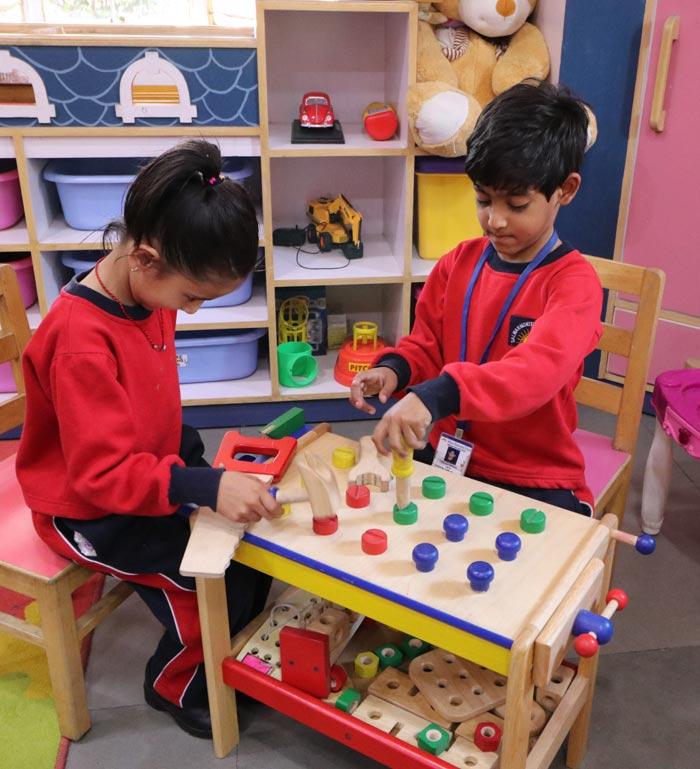Navtika Symposium 1.0

Salwan Education Trust with great pride organised Navtika International Symposium on Learning from progressive countries held on 25th February 2023. The theme of the symposium provided much required guidance to understand the changing paradigms in the field of education and the evolution of a new education system to nurture global citizens. Our Editor-in-chief Dr Indu Khetarpal gave the inaugural address along with the launch of the latest edition of Navtika. The Key note speaker, Dr. Kathryn Murray and the Moderator Ms Manisha Goel set the tone of the event by enlightening the listeners with her views on the importance of ECCE. The attendees also got the opportunity to gather knowledge from the group of panelists Ms Anju Mehta, Ms Paramjeet Kaur Dhillon, Dr Yashashri Vispute, Dr Tannu Kukreja, Dr Komal Verma and Dr Dapinder Kaur Gill who were experts in their respective fields and had a vast pool of ideas for Early Childhood Educators.
The Symposium witnessed participation of over 500 attendees on Zoom and over 1000 viewers on YouTube. With tremendous planning and effort, we could culminate the Symposium on an enriched note and added another feather in our cap with our heads held high.
Navtika Symposium 2.0

To understand and give a broader perspective to the Panchakosha, the ancient concept of Education introduced by NCF 2022 and to make this an integral part of Early childhood education, the Salwan Group of Schools under the aegis of Salwan Education Trust, New Delhi organized the Second Edition of Navtika National Symposium on ‘Panchakosha: Learning to Relearn and discover the essence of Contemporary Education’ under the banner of NAVTIKA in virtual mode. The speakers for this enriching session were (Prof) Dr Venita Kaul, Dr. Seema Negi, Ms. Seema Tuli, Ms. Amrit Nagpal, Dr. Shipra Suneja, Dr. Vasavvi Acharjya and Ms. Devika Nadig. Pancha Koshas, originating from ancient Indian philosophy, refers to the five layers or sheaths that comprise an individual’s existence, emphasizing the holistic nature of human beings.
Vedanta investigates the human uniqueness into five layers/sheaths koshas or levels. It uncovers the fundamental components that give the universe and the microcosm system. It shows us the instrument of the body, brain, and soul, from the gross components that make up the actual body to the more inconspicuous parts of the psyche and awareness. It distinguishes every component, shows us its capability, and shows us the relationship of the multitude of components with one another. All the enthusiastic participants from all across the schools including educators, principals, and parents participated in the symposium. The interactive session on the Pancha Koshas provided a transformative journey into the intricacies of human existence, offering participants a new lens through which to view their children and their world, and how integrating the wisdom of the Pancha Koshas into their children’s lives can bring forth their holistic progress.
NAVTIKA Symposium 3.0

Under the banner ‘NAVTIKA’, powered by Salwan Education Trust, the third edition, Navtika National Symposium 3.0, was organized in virtual mode to know the potential impact of AI under the theme ‘Navigating Artificial Intelligence in Early Childhood Education’. The symposium stressed the importance of embracing change and fostering resilience in integrating AI into Early Childhood curriculum.
The Keynote address delivered by Dr Jagendra Singh and Dr Sapna Yadav, highlighted several beneficial features of AI that has potential impact on early childhood education. They reiterated that AI teaches us important 21st-century skills such as critical thinking, problem-solving, creativity, and collaboration. As AI becomes more integrated into our daily lives and work environments, understanding its capabilities and limitations becomes essential.
AI empowers individuals to make informed decisions, innovate, and adapt to evolving technological landscapes. Ms. Mrunal Ganjale, a dedicated teacher at ZP School Pimpalgaon, Pune district, also a National Teachers Award recipient, was invited to share her school’s innovative approach to education at the symposium.
Despite being in the interiors of Maharashtra, Ganjale has empowered her school with AI and implemented several innovative initiatives which have transformed the learning experience for her students, especially during the challenging times of the COVID-19 pandemic.
Her dedication and innovative spirit serve as an inspiration to educators everywhere, demonstrating the power of education to transcend boundaries and empower students to reach their full potential. The symposium, thereafter, saw a few memorable snippets from the AI Fest held at Salwan Public School, Gurugram, wherein the children were seen being introduced into the transformative and captivating world of AI.
The Eminent Speakers for the Panel Discussion were Mr Vipul Joshi, Ms Paramjeet Kaur Dhillion, Ms Maya Menon, Dr Sween Saini, Ms Vineeta Garg along with the moderator Ms Sona Gombar who shared about the challenges and opportunities of the technological driven world. The insightful discussion, led by a panel of experts, delved into multifaced aspects, unravelling the roles of AI in education, its application for educational purposes, the promising future of AI and the evolving dynamics between physical and Digital learning.
There were approximately 700 attendees on screen and about 500+ on YouTube who attended the Symposium.
The Navtika National Symposium 3.0 served as a dynamic platform for educators and stakeholders to explore the integration of artificial intelligence in early childhood education.
The event showcased opportunities for innovation and collaboration, highlighting the potential of AI to enhance teaching and learning experiences for young children. In conclusion, the symposium highlighted the transformative impact of AI in early childhood education and emphasized the ongoing need for dialogue and collaboration.
By working together, educators and stakeholders can ensure that AI is effectively leveraged to benefit all students, particularly those from disadvantaged backgrounds or with special needs.















